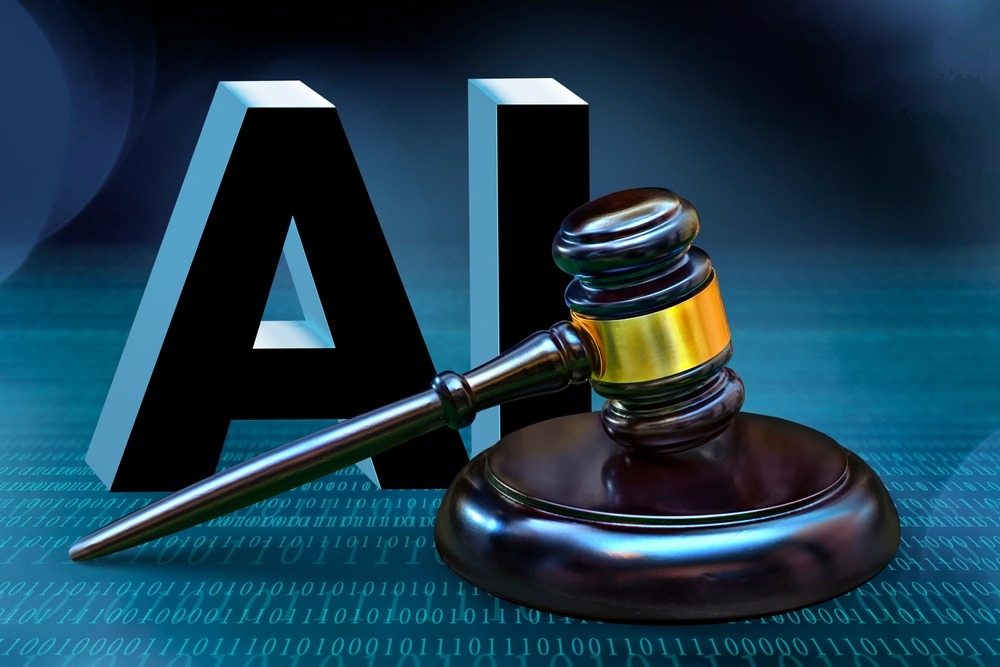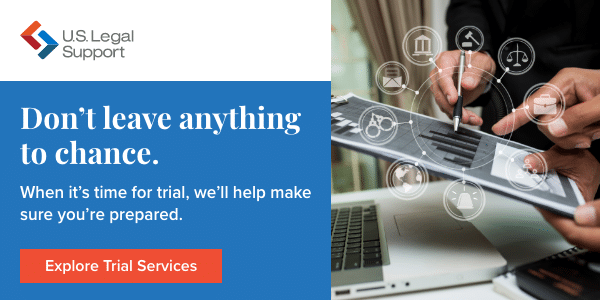The Evolution of AI In Litigation

Although occasional murmurings about general AI reached the public during the 2010s, it was ChatGPT’s November ‘22 entrance onto the global stage that officially introduced the world to artificial intelligence.1 The platform’s stunning research and recall capabilities naturally caught the eye of those in the legal profession. A growing consensus of law professionals now feel that AI’s potential will revolutionize the field.2
For anyone working in, or in close proximity to, the legal world, AI stands ready to serve as a powerful helpmate and resource. But challenges still loom within the contours of this rapidly evolving landscape.
How AI Empowers Lawyers
In 2022, roughly 15% of small firms and 3.7% of solo practitioners indicated they were either currently employing AI technology or interested in doing so.3
By late 2023, those numbers had risen to 20.7% of small firms and 14.6% of solo practitioners.3 Such rapid adoption indicates exceptional utility. So, what have attorneys found so useful?
#1 Predictive Analytics
Taking complex, multi-faceted disputes to trial: it’s a risky move, especially when substantial sums are at stake. The prospect of failure looms large, and the path to victory appears fraught with risk.
In these instances, most firms can’t resist the urge to play it safe and settle. Case intricacy, not to mention the preferences of individual judges, makes it nearly impossible to predict outcomes.
Artificial intelligence, however, specializes in forecasting outcomes. Relying on a roster of potent machine learning algorithms, AI can readily4:
- Analyze vast data libraries
- Examine prior rulings
- Search docket entries
- Account for historical precedent
AI doesn’t restrict its analysis to official docket entries, either. Public opinions and informal writings also fall under its purview. Such immense scope permits AI to account for the ruling habits of particular judges and historical jury trends.
The fruit of this expansive analysis? A confident forecast of case outcome: settle, win, or lose. Armed with such insight, firms may take bold and informed action, perhaps bringing a case to trial that they would historically have settled (and subsequently reaping the rewards of victory).
#2 Document Review
Clients depend on their litigation team to deliver airtight counsel and sound strategies, often within minuscule timeframes. Document review represents the most stubborn obstacle to rapid turnaround. Even for the sharpest legal minds, overwhelming data presents a challenge.
But for AI, oceanic data sets pose no problem. By unleashing machine learning upon the case facts, litigators can:
- Accelerate their document review process
- Furnish clients with answers and advice at lightning speed
Attorneys who utilize AI in legal discovery and research also enjoy elevated confidence. The sheer scope of AI data review renders it unlikely any avenue will remain unexplored.
By saving time, firms also cut costs for clients. Instead of spending countless hours scouring docket entries and summarizing their findings, litigators can cut straight to the chase. This advance has the potential to extend the services of top shelf litigation to clients that might formerly have lacked the means to retain such elite counsel.
#3 Improved Accuracy
While AI systems sometimes produce “hallucinations” (fabricated data or conclusions presented with supreme confidence),5 they also serve to immeasurably enhance the precision of legal output.
In the past, costly legal mistakes, such as faulty citations or an overlooked detail, stemmed from human error. But AI platforms bring the rigor of a supermind to the process.
While large language models still require human review to spot hallucinations and assess conclusions prior to debuting in court, their tireless exactitude does much to scrub human miscues from the equation.
#4 Document Drafting
You’ve likely heard the term “generative AI”. This label refers to artificial intelligence that can produce novel content (as opposed to merely searching for or analyzing data).6
When assessing the timeline and cost of a particular legal venture, one factor that can inflate both measures is document drafting. After attorneys perform extensive review of data related to the case at hand, they must use this information to produce reports containing:
- Exhaustive summaries
- Thorough analysis
- Ironclad arguments
Relying on AI to compose the first draft or two preserves resources for tasks still best suited to humans, such as building relationships and crafting long term visions.
#5 Authoring Advice
One of a lawyer’s most important functions is to furnish sound advice. As generative AI develops, it will grow ever more capable of providing insights that rival those of veteran attorneys.
Lawyers who use such “silent partners” to inform their thinking will certainly enhance their ability to guide clients and steer litigation. With sufficient training, AI platforms may become a sort of elite “co-counsel.”
Firms that take initiative and coach their AI with solid data and clear objectives stand the best chance of producing such powerful advisors.
The Current Landscape
While these immense benefits will likely drive continued adoption of AI technology, the relationship between AI platforms and the legal profession remains fluid. When it comes to forecasting the future state of the field, ongoing challenges muddy the waters, while some prior problems have rapidly resolved.
For attorneys or clients wishing to embrace AI, a firm grasp on the shifting terrain remains critical. Several topics and concerns arise when discussing AI for legal professionals.
#1 Hallucinations
As mentioned previously, AI models have a bizarre tendency to generate imaginary data and citations. Since these models couch them in such a self-assured delivery, it’s easy for false information to slip past unnoticed. Obviously, cases that rely upon hallucinated facts will crumble under the scrutiny of an experienced judge.
So far, this remains a persistent stumbling block. In 2024, a Minnesota case regarding election misinformation made headlines when a lead attorney submitted arguments that cited two nonexistent academic publications.7 The judge castigated the attorney behind the submission and highlighted these fabrications in court. In doing so, he also highlighted the risk of over-reliance on AI for research.
In the rush to deliver results, careful fact-checking of chatbot-generated arguments may be overlooked. So far, a foolproof system for ensuring accuracy has not emerged.
#2 Billable Hours (Or Lack Thereof)
Law firms almost universally bill by the hour,8 rendering time-saving mechanisms like generative AI a threat to hourly income. Some analysts argue that firms should reconsider this compensation style or risk becoming uncompetitive.9
So far, however, the billable hour remains the standard pricing model, although high-value clients may increasingly pressure their law partners to cut their rates, given the availability of time-saving AI tools.
While value-based billing may eventually eclipse time-bound compensation, that day remains far off. Both law firms and clients should closely monitor this debate, however, as it stands to rapidly evolve alongside improving technology.
#3 Model Scale
Initially, most firms embraced the “big players” in AI, such as GPT-4. Generally, the belief was that these immense platforms would deliver correspondingly outsize results.
As firms gained experience, many have concluded that tighter, targeted models (sometimes called “small language models”, or SLMs) better execute niche legal tasks.10 As the field develops, firms will likely blend the work of titanic platforms (i.e., ChatGPT, Claude) with that of streamlined SLMs.
#4 Court Acceptance
As ChatGPT emerged, numerous judges expressed alarm that false citations and other errors would run rampant in submitted filings. Several moved to require attorneys to disclose any use of AI tech in their entries.10 This trend continued into 2024, with more than 200 state and federal judges issuing some form of guidance or ruling on AI usage in the courtroom.11
Despite these guardrails, AI’s usage in litigation has risen steadily, with numerous courts set to employ machine learning in the quest to mitigate case backlog and address urgent matters.12
#5 Chatbots Vs. Agents
ChatGPT and other LLMs like Claude AI, fall under the category of “chatbot” — a computer program that13:
- Replicates human conversation
- Responds to questions
- Learns to provide personalized assistance
Because public chatbots utilize all inputted data in their learning process, firms can’t enter confidential client information. As a solution, they’ve started to develop private chatbots.10
As 2024 unfolded, however, the “AI Agent” supplanted the chatbot as law firms’ go-to machine learning tool. Rather than simply simulate conversation, AI agents:
- Interact with their environment
- Craft strategy
- Take action towards self-determined goals
And none of this requires human management or direction. Although still in its infancy, “agentic” AI promises to play an outsize role in the future of law.
Catch the AI Wave With U.S. Legal Support
Given its self-educating nature, AI’s capabilities will grow exponentially in the coming years, transforming the legal field in ways we currently can’t imagine. The future’s top firms will be those that successfully harness and integrate its powers.
When navigating such uncharted waters, it helps to have an experienced guide. For nearly thirty years, U.S. Legal Support has provided unparalleled litigation support, from discovery to post-trial analysis.
Our rich history furnishes us with the depth of insight required to help you and your clients chart a course through the world of machine learning and toward a vibrant future. Discover how to leverage our experience: Reach out to our team today.
Sources:
- Forbes. A Short History of ChatGPT: How We Got to Where We Are Today. https://www.forbes.com/sites/bernardmarr/2023/05/19/a-short-history-of-chatgpt-how-we-got-to-where-we-are-today/
- Thomson Reuters. Future of Professionals Report 2024: An executive summary for the legal profession. https://legal.thomsonreuters.com/blog/legal-future-of-professionals-executive-summary/
- American Bar Association. 2023 Artificial Intelligence (AI) TechReport. https://www.americanbar.org/groups/law_practice/resources/tech-report/2023/2023-artificial-intelligence-ai-techreport/
- American Bar Association. Using AI for Predictive Analytics in Litigation. https://www.americanbar.org/groups/senior_lawyers/resources/voice-of-experience/2024-october/using-ai-for-predictive-analytics-in-litigation/
- MIT Management. When AI Gets It Wrong: Addressing AI Hallucinations and Bias. https://mitsloanedtech.mit.edu/ai/basics/addressing-ai-hallucinations-and-bias/
- McKinsey. What is generative AI? https://www.mckinsey.com/featured-insights/mckinsey-explainers/what-is-generative-ai
- Minnesota Reformer. Misinformation expert cites non-existent sources in Minnesota deep fake case. https://minnesotareformer.com/2024/11/20/misinformation-expert-cites-non-existent-sources-in-minnesota-deep-fake-case/
- Yale Law School Career Development Office. The Truth About the Billable Hour. https://law.yale.edu/sites/default/files/area/department/cdo/document/billable_hour.pdf
- Legal Dive. Why smart firms are rethinking the billable hour using new AI tools https://www.legaldive.com/news/why-smart-firms-are-rethinking-the-billable-hour-using-new-ai-tools/734146
- Legaltech Hub. 10 Ways Legal’s AI Focus Has (and Has Not) Evolved Since ChatGPT First Launched https://www.legaltechnologyhub.com/contents/10-ways-legals-ai-focus-has-and-has-not-evolved-since-chatgpt-first-launched/
- Bloomberg Law. Litigators Must Do Court-by-Court Homework as AI Rules Flourish.https://news.bloomberglaw.com/us-law-week/litigators-must-do-court-by-court-homework-as-ai-rules-flourish
- Legaltech Hub. Thomson Reuters Launches A2J Legal Innovators Incubator, Enhances AI Policy Consortium for Courts https://www.legaltechnologyhub.com/contents/thomson-reuters-launches-a2j-legal-innovators-incubator-enhances-ai-policy-consortium-for-courts
- Oracle. What is a Chatbot? https://www.oracle.com/chatbots/what-is-a-chatbot/

Editoral Policy
Content published on the U.S. Legal Support blog is reviewed by professionals in the legal and litigation support services field to help ensure accurate information. The information provided in this blog is for informational purposes only and should not be construed as legal advice for attorneys or clients.


